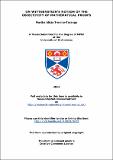Files in this item
On Wittgenstein's notion of the objectivity of mathematical proofs
Item metadata
| dc.contributor.advisor | Sullivan, Peter M. | |
| dc.contributor.author | Trevino-Tarango, Martha Alicia | |
| dc.coverage.spatial | 110 | en_US |
| dc.date.accessioned | 2013-06-13T08:27:46Z | |
| dc.date.available | 2013-06-13T08:27:46Z | |
| dc.date.issued | 2013-06 | |
| dc.identifier.uri | https://hdl.handle.net/10023/3679 | |
| dc.description.abstract | This work analyses and defends Wittgenstein's definition of mathematical objectivity, looking particularly at his account of mathematical proofs, of what makes them normative, and what role mathematical and linguistic practices play in their establishment. It aims to provide a clearer view of Wittgenstein's idea that the objectivity of proofs is inextricably rooted in empirical regularities, detected within what he calls our 'form of life', and which are in turn constituted by both regularities in nature and regularities in human practices. To accomplish this, the thesis makes an exhaustive analysis of Wittgenstein distinction between proofs and experiments. Drawing from Wittgenstein's philosophy of language, this paper addresses important criticisms that have hindered a serious study of his remarks on mathematics, and vindicates his arguments as cogent, solid accounts of mathematical necessity and practice. This exploration will show that mathematical proofs do not have to be regarded as tools for the discovery of mathematical truths, of any sort, that depict mathematical facts, but can be correctly characterised as norms that produce new understanding, forming new concepts to deal with reality, and which ultimately affect the very limits of intelligibility, of what we can think, express and do. Thus, a philosophically relevant link between mathematical proofs and possibilities of action is set. | en_US |
| dc.language.iso | en | en_US |
| dc.publisher | University of St Andrews | |
| dc.rights | Creative Commons Attribution-NonCommercial-NoDerivs 3.0 Unported | |
| dc.rights.uri | http://creativecommons.org/licenses/by-nc-nd/3.0/ | |
| dc.subject | Philosophy of mathematics | en_US |
| dc.subject | Wittgenstein | en_US |
| dc.subject | Mathematical proof | en_US |
| dc.subject | Mathematical objectivity | en_US |
| dc.subject | Mathematical practice | en_US |
| dc.subject | Philosophy of language | en_US |
| dc.subject | Form of life | en_US |
| dc.subject.lcc | B3376.W564T84 | |
| dc.subject.lcsh | Wittgenstein, Ludwig, 1889-1951 | en_US |
| dc.subject.lcsh | Objectivity | en_US |
| dc.subject.lcsh | Mathematics--Philosophy | en_US |
| dc.title | On Wittgenstein's notion of the objectivity of mathematical proofs | en_US |
| dc.type | Thesis | en_US |
| dc.type.qualificationlevel | Doctoral | en_US |
| dc.type.qualificationname | MPhil Master of Philosophy | en_US |
| dc.publisher.institution | The University of St Andrews | en_US |
| dc.publisher.department | University of Stirling | en_US |
This item appears in the following Collection(s)
Except where otherwise noted within the work, this item's licence for re-use is described as Creative Commons Attribution-NonCommercial-NoDerivs 3.0 Unported
Items in the St Andrews Research Repository are protected by copyright, with all rights reserved, unless otherwise indicated.


